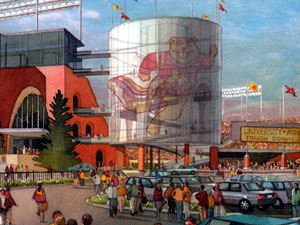January 5, 2005
 |
| About a year ago, school leaders produced a feasibility study for a 50,000-seat, open-air stadium that would be built near existing basketball and hockey arenas. At the time the cost was pegged at $220 million. (Courtesy of University of Minnesota stadium committee) |
St. Paul, Minn. — (AP) Even though it doesn't have full financing in place, the University of Minnesota took a bold step this week toward bringing Gopher football to a new on-campus stadium.
In a notice published Monday in the State Register, the university issued a call for a consultant to undertake an environmental review of the proposed site. They expect to select someone within a month in hopes of having the study done by this time next year. It could cost as much as $1.5 million, but school officials say they'll cover it with private donations.
"In order to have this stadium open in the fall of 2008, this activity has to start now," said Richard Pfutzenreuter, the university's chief financial officer.
The environmental review will gauge the site's attractiveness in terms of ground quality and expected impact on noise, traffic and lighting in the neighborhood.
The study will coincide with the Legislature's consideration of bills committing state funds for anywhere from 25 percent to 40 percent of the anticipated $235 million pricetag. The university hopes to come up with the rest through fund-raising, student fees and increased game-day revenues. It hasn't detailed the amount of private pledges to date.
Sen. Geoff Michel, R-Edina, introduced a Gopher stadium financing proposal Tuesday with co-sponsors from both political parties. A companion House bill is in the works.
"It's a good read by the university to keep taking steps forward," Michel said. "That confidence is well placed."
Since 1982, the Gophers have shared the Metrodome with two pro teams, baseball's Twins and football's Vikings. And almost as long, alumni and students have been seeking to return the team to campus.
About a year ago, school leaders produced a feasibility study for a 50,000-seat, open-air stadium that would be built near existing basketball and hockey arenas. At the time the cost was pegged at $220 million.
Rising in steel prices and other construction cost increases have pushed the project total up $15 million. The cost will only continue to climb, which is why the university is pushing ahead with the environmental study now, Pfutzenreuter said.
"If they don't pass a bill this session this stadium is delayed another year and will cost another $10 million at least," he said. "We have to have it this session."
Gov. Tim Pawlenty has provided encouragement to the university, if not outright support.
"In terms of our stadium challenges, that's the team that can't leave the state," Pawlenty said this week. "But we would be interested in helping them if they did come forward a proposal."




